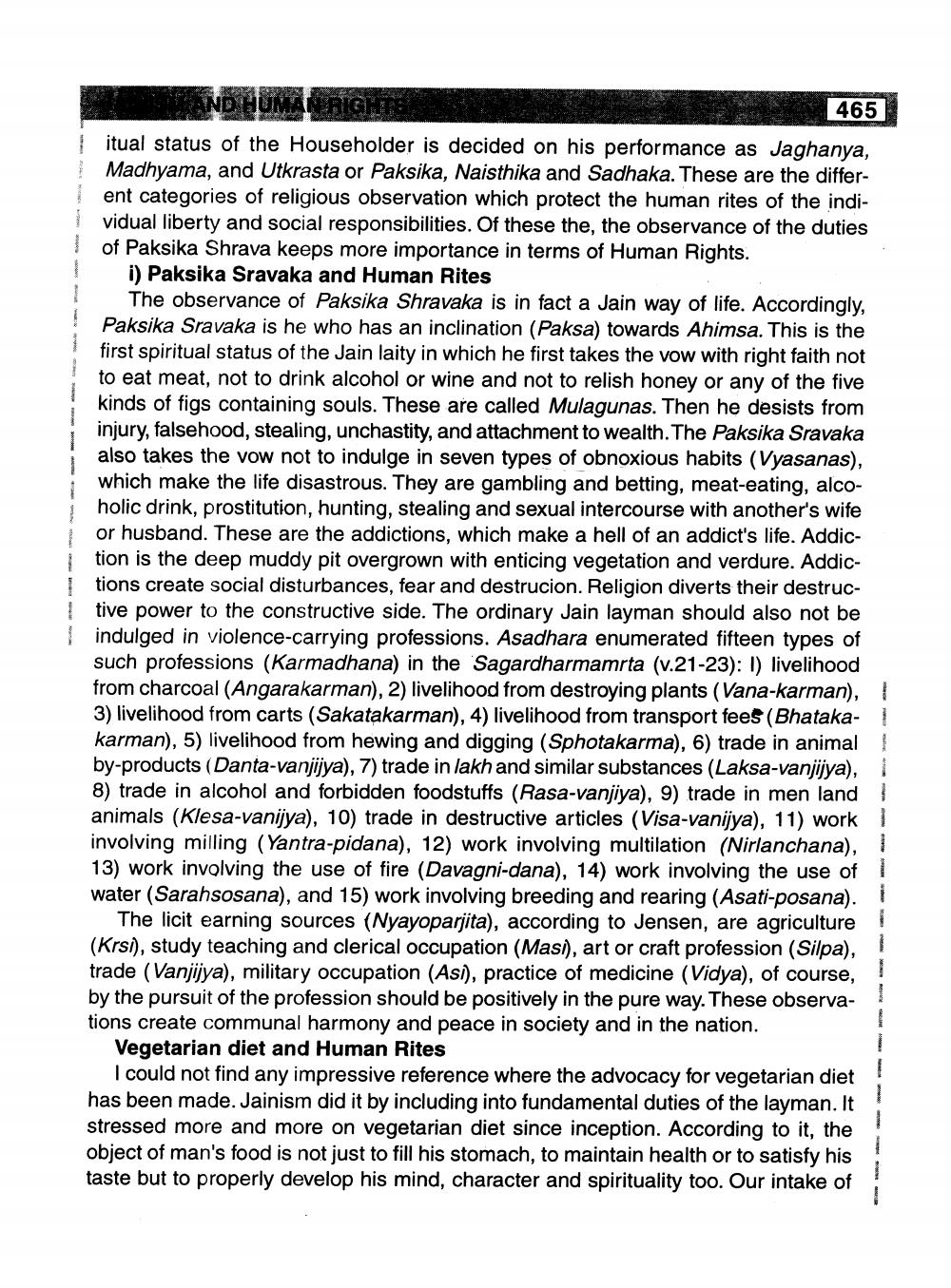________________
LAND HUMAN RIGHTEO
4 65 itual status of the Householder is decided on his performance as Jaghanya, Madhyama, and Utkrasta or Paksika, Naisthika and Sadhaka. These are the different categories of religious observation which protect the human rites of the individual liberty and social responsibilities. Of these the, the observance of the duties of Paksika Shrava keeps more importance in terms of Human Rights.
i) Paksika Sravaka and Human Rites
The observance of Paksika Shravaka is in fact a Jain way of life. Accordingly, Paksika Sravaka is he who has an inclination (Paksa) towards Ahimsa. This is the first spiritual status of the Jain laity in which he first takes the vow with right faith not to eat meat, not to drink alcohol or wine and not to relish honey or any of the five kinds of figs containing souls. These are called Mulagunas. Then he desists from injury, falsehood, stealing, unchastity, and attachment to wealth. The Paksika Sravaka also takes the vow not to indulge in seven types of obnoxious habits (Vyasanas), which make the life disastrous. They are gambling and betting, meat-eating, alcoholic drink, prostitution, hunting, stealing and sexual intercourse with another's wife or husband. These are the addictions, which make a hell of an addict's life. Addiction is the deep muddy pit overgrown with enticing vegetation and verdure. Addictions create social disturbances, fear and destrucion. Religion diverts their destructive power to the constructive side. The ordinary Jain layman should also not be indulged in violence-carrying professions. Asadhara enumerated fifteen types of such professions (Karmadhana) in the Sagardharmamrta (v.21-23): 1) livelihood from charcoal (Angarakarman), 2) livelihood from destroying plants (Vana-karman), I 3) livelihood from carts (Sakatakarman), 4) livelihood from transport fees (Bhatakakarman), 5) livelihood from hewing and digging (Sphotakarma), 6) trade in animal by-products (Danta-vanjijya), 7) trade in lakh and similar substances (Laksa-vanjijya), 8) trade in alcohol and forbidden foodstuffs (Rasa-vanjiya), 9) trade in men land ! animals (Klesa-vanijya), 10) trade in destructive articles (Visa-vanijya), 11) work 1 involving milling (Yantra-pidana), 12) work involving multilation (Nirlanchana), 1 13) work involving the use of fire (Davagni-dana), 14) work involving the use of 1 water (Sarahsosana), and 15) work involving breeding and rearing (Asati-posana).
The licit earning sources (Nyayoparjita), according to Jensen, are agriculture (Krsi), study teaching and clerical occupation (Masi), art or craft profession (Silpa), trade (Vanjijya), military occupation (Asi), practice of medicine (Vidya), of course, by the pursuit of the profession should be positively in the pure way. These observations create communal harmony and peace in society and in the nation.
Vegetarian diet and Human Rites
I could not find any impressive reference where the advocacy for vegetarian diet has been made. Jainism did it by including into fundamental duties of the layman. It stressed more and more on vegetarian diet since inception. According to it, the object of man's food is not just to fill his stomach, to maintain health or to satisfy his taste but to properly develop his mind, character and spirituality too. Our intake of




